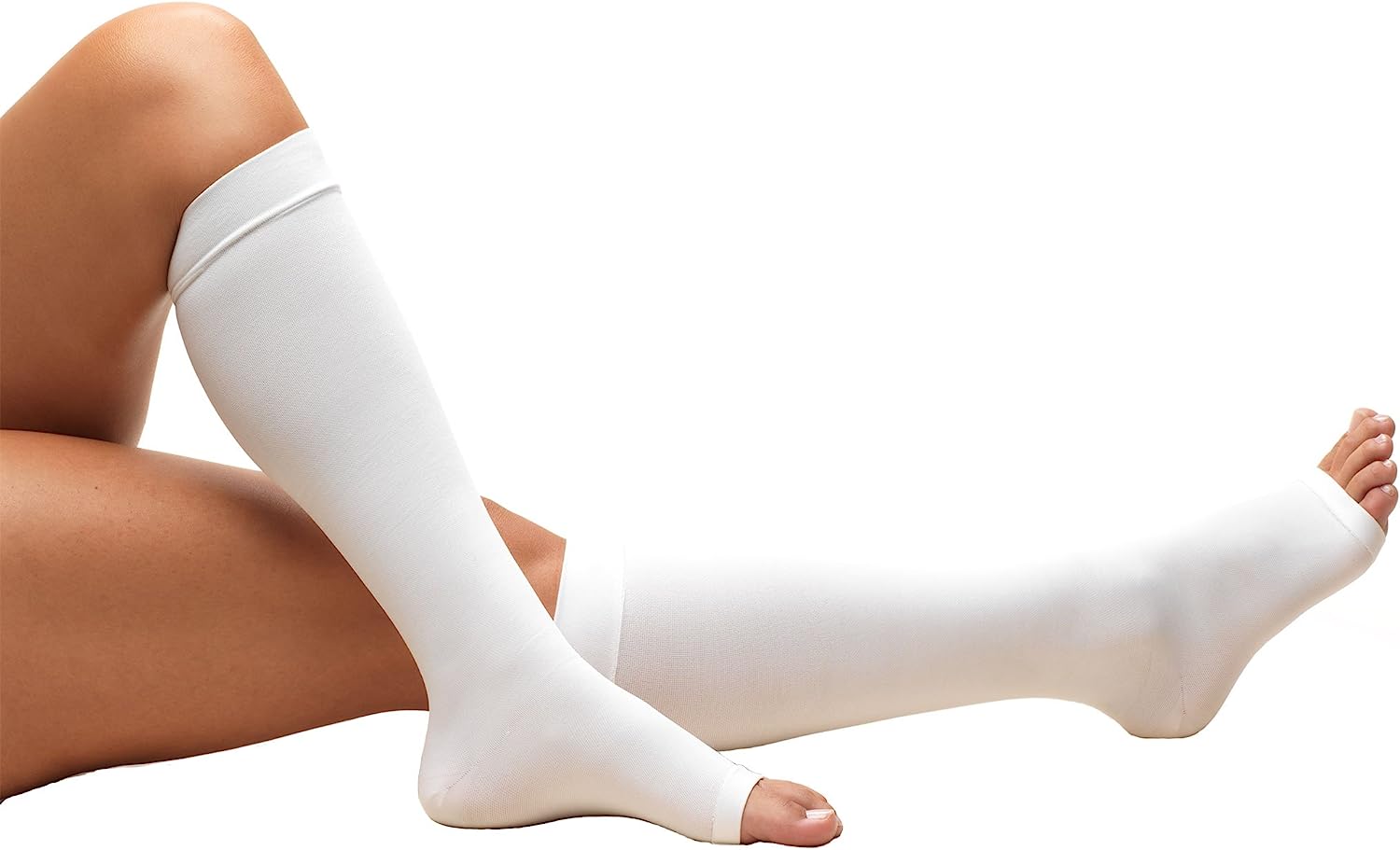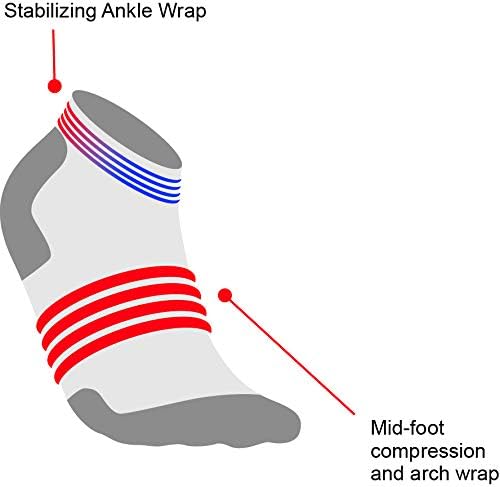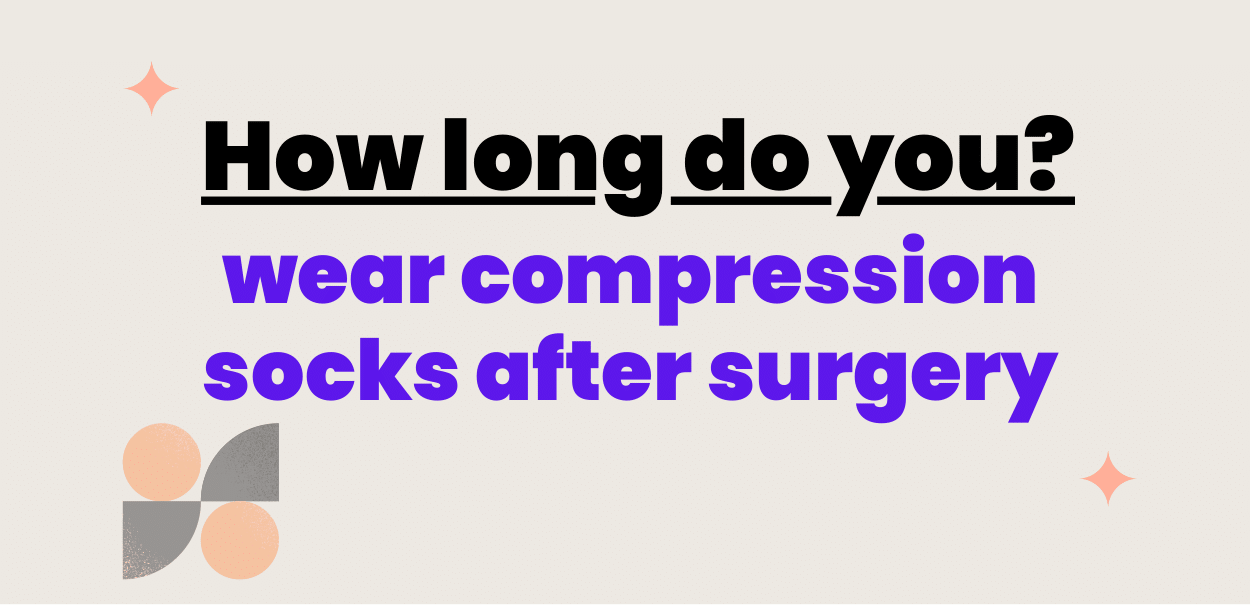Compression socks play a crucial role in post-surgical recovery by promoting healing and reducing the risk of complications. How long do you wear compression socks after surgery after surgery varies based on various factors. Such as the type of surgery and individual patient considerations. Understanding the recommended duration can ensure a smooth and safe recovery journey.”
Compression socks are specialized garments that apply a specific amount of pressure to the legs, helping to improve blood flow and prevent blood clots. They are commonly used as a post-surgical aid to promote healing and reduce the risk of complications.
The amount of pressure compression socks put in is determined by the compression strength which is listed in its description. However, the duration for which compression socks should be worn after surgery can vary depending on the type of surgery. Individual patient factors and specific medical recommendations also count.
This article will explore the general guidelines and research findings regarding the duration of compression sock usage after surgery.
Best Compression Stockings for Women

Truform Surgical Stockings, 18 mmHg Compression socks
- 89% nylon, 11% spandex
- Ted style for reclined patient recovery
- A defined heel enhances the fit
- Help lessen the danger of thrombi embolism
- Helps treat swelling, edema fluid retention, pooling of blood, pulmonary embolism
- Latex-Free; Nylon and Spandex construction
How important is it to wear compression socks after surgery?
Surgery, regardless of its type, can increase the risk of developing blood clots in the legs, known as deep vein thrombosis (DVT).
However, compression socks exert graduated pressure on the legs, thereby reducing the diameter of veins, improving blood flow, and preventing blood pooling. Consequently, compression socks play a crucial role in lowering the risk of potentially life-threatening complications associated with DVT.
How long do you wear compression socks after surgery? Research Findings and Recommendations:
The length of time you should wear compression socks after surgery can differ depending on various factors. Such as the type of surgery, your personal characteristics, and the recommendations of your medical professional.
Moreover, research studies have offered valuable insights into determining the best duration for wearing compression socks during your recovery period. These guidelines are essential for promoting healing and minimizing the risk of complications.
Orthopedic Surgeries:
Orthopedic surgeries refer to joint replacements. Studies have shown that wearing compression socks for at least 10-14 days can significantly reduce the risk of DVT and related complications. (Kakkos et al., 2017).
In a study conducted by Amlie et al. in 2016, researchers randomly assigned patients who went through knee arthroplasty (knee replacement) to two groups.
One group wore compression stockings for two weeks after surgery, while the other group did not wear them.
The study found that the patients who wore compression stockings had a much lower risk of developing deep vein thrombosis (DVT) compared to those who did not wear compression socks.
Here are some of our recommendations for the Best Compression socks for neuropathy
Best Compression Socks Unisex

Truform Surgical Stockings, 18 mmHg Compression Socks
- 36% Nylon, 25% Nylon, 19% Copper Polyester, 13% Polyester, 7% Elastic
- Machine Wash
- Represents the highest level of performance running socks
- Features Thorlo thin cushion in the heel and forefoot
- Thor-Wick COOL fibers move moisture quickly
- Mid Foot compression and arch wrap
- Stabilizing ankle wrap reduces ankle strain and turn
- Copper Ion fibers incorporated in the sock
Abdominal and Pelvic Surgeries:
For surgeries involving the abdomen or pelvis, the risk of DVT is higher due to the disruption of blood flow caused by the procedure.
Research suggests that patients who undergo abdominal or pelvic surgeries should wear compression socks for up to four weeks postoperatively to minimize the risk of DVT (Lassen et al., 2012).
A systematic review by NICE (National Institute for Health and Care Excellence) also recommends a duration of four weeks for compression sock usage after major abdominal surgery.
Bariatric Surgeries:
Bariatric surgeries, such as gastric bypass or gastric banding, involve significant changes in body weight and metabolism. Studies have shown that patients who undergo bariatric surgeries are at an increased risk of developing DVT.
To mitigate this risk, medical professionals recommend wearing compression socks for up to six weeks after bariatric surgery (Merriman et al., 2016).
Varicose Vein Surgery:
Patients who undergo varicose vein surgery often wear compression stockings before and after the procedure. The duration of compression sock usage after varicose vein surgery varies based on individual patient factors and surgeon recommendations.
In general, healthcare providers may advise patients to wear compression stockings for a few weeks to several months postoperatively (Darwood et al., 2014).
Individual Patient Factors:
It is important to remember that the guidelines we mentioned earlier are general recommendations. However, each person is unique, and their individual factors need to be taken into account.
Some patients might have a higher risk of developing blood clots due to existing medical conditions, genetic factors, or limited ability to move around.
In these situations, a healthcare professional might suggest wearing compression socks for a longer period after surgery to ensure better protection and recovery.
FAQs: How Long Should You Wear Compression Socks After Surgery?
1:Why do I need to wear compression socks after surgery?
Compression socks help improve blood circulation, prevent blood clots, and reduce the risk of complications such as deep vein thrombosis (DVT) after surgery. They aid in healing and promote a smoother recovery.
2: Can I remove the compression socks for certain activities?
It is important to follow the guidelines provided by your healthcare provider. While some activities may permit the temporary removal of compression socks, healthcare professionals generally recommend wearing them consistently during the initial recovery period to maximize the benefits they offer.
3: How should I care for my compression socks?
Proper care is essential for the longevity and effectiveness of compression socks. Follow the manufacturer’s instructions for washing and drying, and avoid using fabric softeners or bleach. Replace your compression socks as needed to ensure proper compression levels.
4: Should I wear compression socks during or after pregnancy?
Yes, wearing compression socks during and after pregnancy can be beneficial. They help improve blood circulation, reduce swelling, alleviate leg discomfort, and lower the risk of varicose veins and blood clots.
5: Can I sleep in compression socks after surgery?
Yes, you can sleep in compression socks after surgery. Sleeping in compression socks helps maintain consistent pressure on your legs, promoting proper blood flow and reducing the risk of blood clots. However, it’s recommended not to at many places.
Wrapping it Up: 🎉
How long do you wear compression socks is a question whose answer is depended on various factors. Such as the specific surgical procedure, unique patient characteristics, and the recommendations of medical professionals.
These factors collectively shape the optimal duration for wearing compression socks, ensuring personalized care and promoting a successful recovery.
While guidelines exist for different surgical procedures, it is crucial to consult with your surgeon or healthcare provider. They will help determine the optimal duration of compression sock usage in your specific case.
Following their recommendations can help reduce the risk of DVT and other related complications, aiding in a smoother recovery post-surgery.




